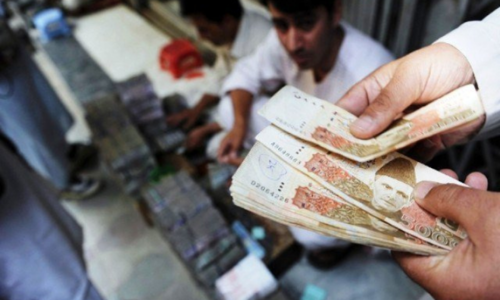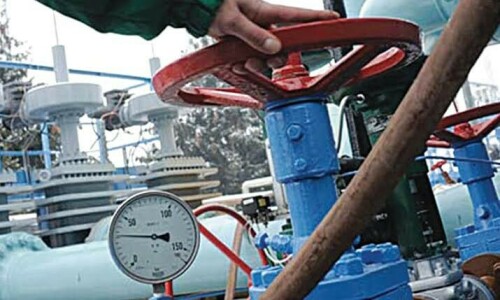Finance Minister Shaukat Tarin stressed on Sunday the need to focus on the country's economic growth, saying the Economic Advisory Council (EAC) had been tasked with devising long-term, medium-term and short-term plans and roadmaps for growth in 12 major sectors.
Tarin, who was addressing a pre-budget webinar, said since the government lacked resources to invest in the growth of all sectors, it had decided to focus on 12 major areas, including agriculture, housing and power, which would put the country on the road to "inclusive and sustainable growth".
"What we want ... is inclusive and sustainable growth over a long period of time," he said, regretting that Pakistan had never seen a long period of sustainable growth except in the 60s.
Therefore, he said he had asked the EAC to identify factors that hampered long-term economic growth in Pakistan.
Announcing that steps would also be taken to empower the planning commission, Tarin said it would lead to "planned growth" and give a roadmap that could be followed by not just the current government but also subsequent governments.
"It is a hallmark. Countries that have grown economically have had a consistent planning process," he noted. "Our focus has shifted to economic growth and to grow the economy, revenues would have to be increased first."
He said the government planned to add Rs1 trillion to the revenue scheme next year, while the projected revenue collected for this year was Rs4.8 trillion, which would be a first in the country's history.
Tarin further said he aimed to increase next year's revenue collection to Rs5.8 trillion.
The finance minister said the growth rate of the economy. which was around 1.5 per cent prior to the Covid-19 pandemic, went negative following the health crisis.
But the government and the State Bank of Pakistan introduced stimulus packages for the needy and the business sector, respectively, which resulted in the stabilisation of the economy and curtailing of account deficit, he added.
"Yet economic growth showed no improvement for long," said Tarin, adding that the economy had started to recover this year as large-scale manufacturing and exports began to pick up and major crops, except cotton, were "robust".
And with the economy picking up, the revenue of the government has been increasing, he said, noting that this month revenue collection crossed the Rs4 trillion mark for the first time in Pakistan's history.
"We are seeing the economy grow by 3.94pc when people predicted at the start of this fiscal year that it (growth rate) will be around 1.5pc."
Agriculture and exports
With respect to the Public Sector Development Programme (PSDP), the finance minister said the government planned to spend Rs650 billion on it this year, while he aimed to increase the spending to Rs900bn next year.
"But it will have to be efficient and since the planning commission has started public-private partnership initiatives, Rs900bn [for the PSDP] will have a greater impact on the ground," he added.
Tarin also emphasised the need of reviving and growing the agriculture sector.
"We used to be a food-exporting country, but now we are a net food-importing country," he regretted, stressing the need to focus on developing and improving all elements of the agriculture chain.
He said the government had a progressive plan in place for the purpose and incentives would be offered to the agriculture sector in the upcoming budget.
"We have to make our [agriculture] industry more efficient. When we make our industry efficient ... we export more."
He added that equal importance was to be given to increasing exports.
"Exports, exports, exports. That is the mantra," he said, adding that the government would also incentivise exports and increase IT exports to Rs8bn next year and introduce foreign direct investment in the export sector.
Tarin also linked increasing agricultural produce to controlling prices.
In this regard, he said a mechanism needed to be devised to curtail the role of middlemen in the agriculture activity, establish cold storage and provide farmers direct access to wholesale markets.
Besides, he said, the government intended to give incentives to the services sector and make e-commerce more efficient through digitisation.
He added that measures needed to be taken to decrease the country's circular debt.
'Bottoms-up' approach
The minister assured that there would not be any increase in electricity tariff in the near future, as committed by Prime Minister Imran Khan, but pointed out the need for bringing stability in the power sector.
"We are not going to introduce new taxes, but only remove incentives being given to people we believe have been receiving the incentives for no rhyme or reason," he said.
He said the government planned to adopt a "bottoms-up" approach so that the bottom rung of the economy could benefit from the economic growth.
Moreover, he said the government intended to limit the role of the Federal Board of Revenue, but in that case, citizens would have to duly pay their taxes or action would be taken against them.
The minister also called for investing in the development of human resources, improving the financial sector and removing regional disparity in resource allocation.
"[And] we have to bring in technology in all facets of our economic life to make the economy more efficient," he said.
Tarin also criticised the International Monetary Fund for mandating that Pakistan have a 13.25pc discount rate when the inflation was high.
"I think ... it was an overkill [and] cost us hundreds of billions of rupees."













































